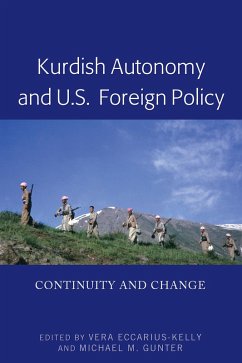This book evaluates U.S. foreign policy patterns towards Kurdish movements in Turkey and Syria and the Kurdistan Region of Iraq. In the first section of the collection, U.S. foreign policy approaches are examined by comparing multiple U.S. administrations and their responses to Kurdish demands for autonomy. While Kurds have been used to advance particular policy interests, several contributors also identify challenges to Kurdish independence movements linked to ideological divisions and patronage structures. However, Kurds could benefit from political changes even if U.S. policy preferences favor maintaining established borders.
In the second section, several contributors explore the Kurdistan Regional Government's unfulfilled expectations and the fallout from the 2017 independence referendum. Consecutive U.S. administrations have been reluctant to destabilize the region, supported efforts by Turkey to co-opt the KRG, and impeded Kurdish movements in Syria and Turkey.
Finally, the third section analyzes the ways in which Kurdish movements have responded to long-standing patterns of U.S. foreign policy preferences. Here contributors examine Kurdish lobbying efforts in the United States, discuss Kurdish para-diplomacy activities in a comparative context, and frame the YPG/J's (People's Protections Units/Women's Protections Units) and PYD's (Democratic Union Party) project in Syria. Broader power structures are critically examined by focusing on particular Kurdish movements and their responses to U.S. foreign policy initiatives.
In the second section, several contributors explore the Kurdistan Regional Government's unfulfilled expectations and the fallout from the 2017 independence referendum. Consecutive U.S. administrations have been reluctant to destabilize the region, supported efforts by Turkey to co-opt the KRG, and impeded Kurdish movements in Syria and Turkey.
Finally, the third section analyzes the ways in which Kurdish movements have responded to long-standing patterns of U.S. foreign policy preferences. Here contributors examine Kurdish lobbying efforts in the United States, discuss Kurdish para-diplomacy activities in a comparative context, and frame the YPG/J's (People's Protections Units/Women's Protections Units) and PYD's (Democratic Union Party) project in Syria. Broader power structures are critically examined by focusing on particular Kurdish movements and their responses to U.S. foreign policy initiatives.
Dieser Download kann aus rechtlichen Gründen nur mit Rechnungsadresse in A, D ausgeliefert werden.
"Few would dispute that the Middle East is disintegrating socially, politically, and even territorially. The Kurds, the forgotten and dismissed people of the past century, have risen to play an important role in the emerging Middle East. Whether they will survive the reshuffling of power and carve out a political space for themselves is largely a function of U.S. policy toward the region. This collection offers a timely and much-needed examination of the complex U.S.-Kurdish relations in a volatile and strategically important region." -Mehmet Gurses, Professor of Political Science, Florida Atlantic University


